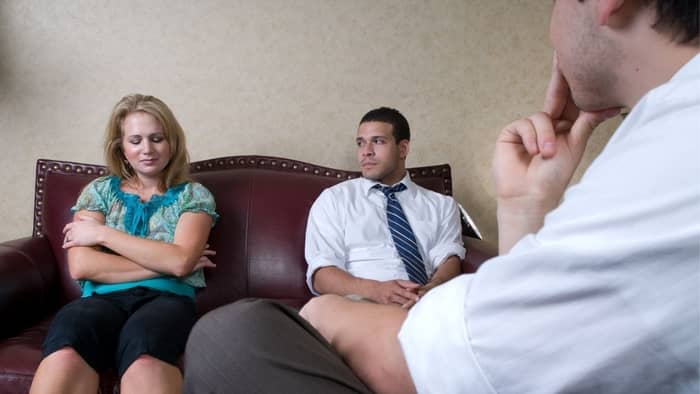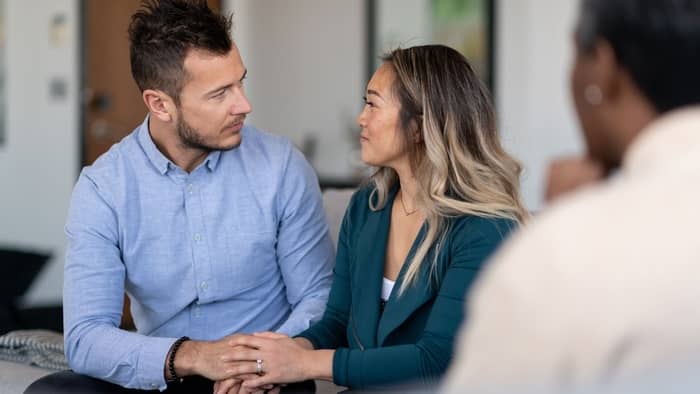Last Updated on February 28, 2022 by Guillermina
Today, we’re going to be looking at non-religious marriage counseling and its success rate. We’ll also be taking a deep dive into what you can expect to talk through in your marriage counseling sessions and many other burning questions you may be itching to ask.
In the words of Shakespeare, “the course of true love never did run smooth”, and that is true, even in the happiest of marriages. There are times in our lives where we may need a sounding board, a neutral person, and a way to resolve any issues you may have in a controlled, professional environment. Many couples go to marriage counseling and it’s in no way failing your marriage. If anything, it’s the complete opposite! You’re both willing to do whatever it takes to make your marriage work – and that’s what being committed is all about. So let’s take a look into marriage counseling.
What Is Marriage Counseling?
You may not even be familiar with what marriage counseling is – and that’s completely okay! A marriage counselor is a professional therapist that focuses on just relationships and marital issues. Whether you’ve lost the spark, there’s financial worries, infidelity worries – the counselor will help to talk through it all with you as a couple, in a safe environment.
The counselor will likely use a range of techniques, including role-playing, role modeling, analyzing behavior patterns (positive or negative), and most importantly – discussions. Open discussions where you and your partner are on an equal playing field and have a chance to express how you feel with a non-religious therapist (religious therapy is, of course, available).
How Much Does Marriage Counseling Cost?
The cost of a marriage counseling session will depend on where you live, the qualifications of your counselor, and how many sessions you choose to have. The usual price range you can expect for an hour’s session is between $50-$200, depending on the variety of factors above. Some counselors may offer reduced rates if you’re low income or need additional support, so it’s worth asking if you have financial worries.
What Do You Do At Marriage Counseling?
It’s important for both of you to attend the sessions. While you can attend marriage counseling alone, it’s much more successful if you work on the problems together. The sessions are to create a space where you both feel equal, and both feel heard. You’ll do a range of various exercises to ensure you both have the chance to express how you feel, in different situations.
The counselor will then be able to give you some ways to move forward, and how to help you both with communicating on a deeper level. It can be very intense and overwhelming, so it’s best to go in with an open mind, and be aware that whatever you feel is right and valid. The marriage counselor isn’t there to judge or give her opinions on your situation; they are there to help you move past them, and offer ways to do this effectively.
It’s important to note that you’ll be exploring every layer of your relationship in-depth, and it’s best to try to go in with an open mind and willingness to share. From your sexual desires to the dynamics of your relationship, to the strengths and weaknesses of your partner. It can be brutal, and you’ll likely feel exhausted after the first session. But that just means you’re doing it right!
Conclusion
I hope this article has helped to give you an insight into nonreligious marriage counseling and how effective it can be when using the right professional. It’s important to note that not all couples find therapy works for them, so don’t feel disheartened if it isn’t for you and your partner.
Be sure to talk to the therapist before you commit to any sessions, so you both feel comfortable and happy with her/his outlook. If either of you feels uncomfortable with the choice of therapist, the counseling simply won’t work. Check out some tips on how to find the right therapist for you, here.
If you’re brave enough to share, did you find marriage counseling helpful? If so, I would love to hear your experiences in the comments below. You may be helping out future couples with their own marriages. Sharing is caring!
FAQs
What is the Success Rate for Marriage Counseling?
The American Association of Marriage reports that the success rate of marriage is a staggering 98%! Time and time again, therapy has been proven to be a great way to resolve and work through any ongoing issues you have - whether in marriage, or other areas of your life. While these numbers are incredibly high, please remember that counseling isn't for everyone, and some people struggle to express their emotions and may take longer to express themselves - this is also completely valid.
Can a Marriage Survive Without Counseling?
Of course. While counseling is a good starting point to show that you're both committed to making the relationship better, counseling is not the only option. As long as you're both open and willing to work on your relationship, any relationship can move forward.
What Should I Not Tell a Marriage Counselor?
There aren't really any right or wrong things to tell a counselor. You should try to be as open as possible with your counselor, especially if your partner is present. One important thing not to do, is to undermine what they're telling you. They are qualified for the service they're providing, and are likely giving you the tools you need to move forward with your relationship. So try not to resist, even if what they're saying makes you angry or upset - that's completely normal.
How Long Should Marriage Counseling Last?
The typical length of a session for counseling will last around an hour, and you're looking at a minimum of around 6 sessions. This is to ensure you can get the most out of your counseling, and try out some of the tools and advice your counselor gives about how to move forward.

